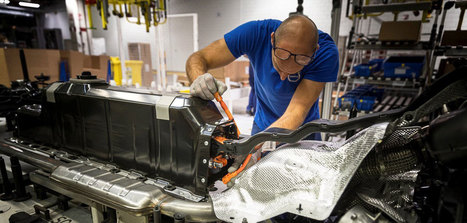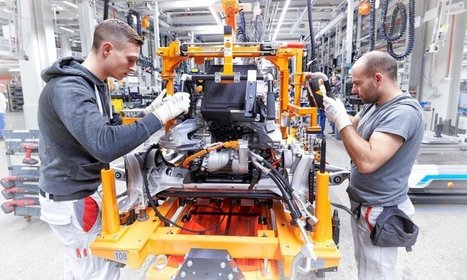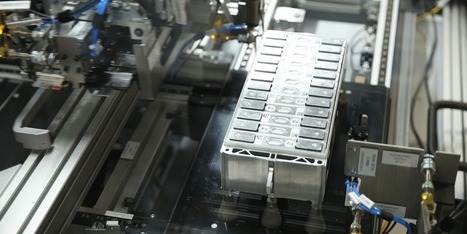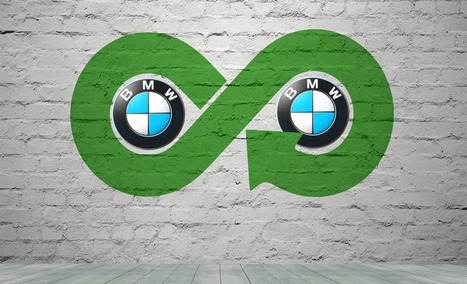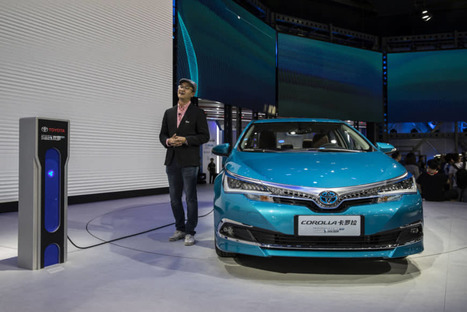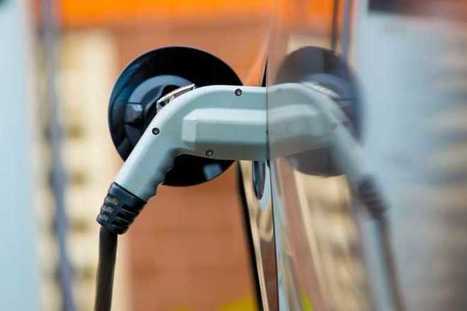 Your new post is loading...

|
Scooped by
EcoVadis
November 20, 2019 12:47 AM
|
HashCash Consultants announced a partnership with a consortium of car manufacturing companies to build a blockchain platform to help facilitate the tracking of minerals for battery construction. This according to news published by PRNewswire on November 18.

|
Scooped by
EcoVadis
November 19, 2019 4:54 AM
|
Volvo Cars has announced plans to become the first auto maker to enable global traceability of the cobalt used in its batteries through the application of blockchain technology. This significantly boosts transparency of the raw material supply chain as the information about the material’s origin cannot be changed undetected.

|
Scooped by
EcoVadis
September 12, 2019 3:53 AM
|
Leading emergency logistics supplier Evolution Time Critical has warned the automotive sector to be extra vigilant with regard to its supply chain reliability in the light of new environmental regulations affecting sea freight transport. The International Maritime Organization (IMO) 2020 Regulations, which cut the maximum allowable sulphur content in fuel by more than 85%, officially come into force on 1st January, but could start to impact operations as early as Quarter 4 this year.

|
Scooped by
EcoVadis
September 4, 2019 2:38 AM
|
"Roughly three quarters of all industry CO2 emissions are generated during a car's operation over its lifetime, but 18 percent still comes from the supply chain," said Luke Fletcher, senior analyst for investor research and autos specialist at Carbon Disclosure Project. "As sales of battery-powered vehicles displace their combustion engine rivals, that share will steadily become more important over time."

|
Scooped by
EcoVadis
August 20, 2019 3:43 AM
|
Volkswagen Group, for its recent very timely announcement that as of the first of this month, it has introduced a worldwide sustainability rating for its suppliers, saying that sustainability is fast becoming a decisive business factor.

|
Scooped by
EcoVadis
May 24, 2019 3:21 AM
|
Mercedes-Benz has set a target to ensure its new passenger car fleet is carbon neutral by 2039. It has also committed to ensure plug-in hybrids or all-electric vehicles (EVs) make up more than 50% of its car sales by 2030 under its ‘Ambition2039’ initiative.

|
Scooped by
EcoVadis
April 30, 2019 3:39 AM
|
After Andreas Wendt, the Board Member responsible for purchasing, recently announced that BMW will no longer purchase cobalt from Congo for the introduction of the fifth generation of electric vehicles from 2020/21, it is now clear that the raw material will instead come from Australia and Morocco.

|
Scooped by
EcoVadis
April 16, 2019 3:21 AM
|
According to Andreas Wendt, the board member responsible for purchasing at BMW, the company will no longer purchase cobalt from the Democratic Republic of Congo with the introduction of the fifth generation of electric vehicles from 2020/21.

|
Scooped by
EcoVadis
March 22, 2019 3:06 AM
|
The Group is planning to launch almost 70 new electric models in the next ten years – instead of the 50 previously planned. Expanding e- mobility is an important building block on the road to a CO2-neutral balance. Volkswagen has signed off a comprehensive decarbonization program aimed at achieving a fully CO2-neutral balance in all areas from fleet to production to administration by 2050. Volkswagen is thus fully committed to the Paris climate targets.

|
Scooped by
EcoVadis
February 21, 2019 2:44 AM
|
Volkswagen has unveiled its latest electric car, one that will reduce more than 1mn tonnes of Co2 per year right through the supply value chain. The Volkswagen ID has been hailed as a “pioneer of sustainable mobility” and the company has noted that the manufacturing phase alone will save more than 1mn tonnes of Co2 per year. The new car will head into production at the company’s Zwickau production plan in late 2019 and will represent a comprehensive decarbonisation programme that will see similar sustainable measures for its other models. Volkswagen will look to offer more than 20 fully electric models by 2025.
|

|
Scooped by
EcoVadis
November 20, 2019 12:41 AM
|
Volvo Cars has announced plans to become the first auto maker to enable global traceability of the cobalt used in its batteries through the application of blockchain technology. This significantly boosts transparency of the raw material supply chain as the information about the material’s origin cannot be changed undetected.

|
Scooped by
EcoVadis
October 7, 2019 12:41 AM
|
The German luxury automaker BMW has long been known for its manufacturing prowess. But as manufacturing and heavy industry come under fire for their high emissions and lack of transparency, many companies are looking to take action. The long-time carmaker is no different — and many of its techniques are actually circular economy practices, from recycled materials to product design to business model innovation.

|
Scooped by
EcoVadis
September 5, 2019 2:33 AM
|
Toyota Motor Corp. has started recycling hybrid-vehicle batteries in Thailand, aiming to establish a sustainable process for the power source behind eco-friendly cars and cut costs. The carmaker said at Friday’s launch event it is reusing nickel-metal hydride batteries by utilizing some of them as storage cells for nonvehicular uses, and extracting minerals from them to make brand-new batteries in Japan.

|
Scooped by
EcoVadis
August 20, 2019 3:47 AM
|
The supply chain of the Audi e-tron* is becoming more sustainable: The aluminum producer Hydro now supplies sustainable aluminum for the battery housing of the first fully electric model of the company. The material is processed and manufactured along the entire process chain in an environmentally friendly manner and under socially acceptable working conditions. This has been confirmed by the Aluminium Stewardship Initiative (ASI) with a “chain of custody” certificate.

|
Scooped by
EcoVadis
June 3, 2019 3:09 AM
|
The Zero-Emission Vehicles Act (ZEVA), passed on May 29, 2019, means all new light-duty cars and trucks sold in the province will be clean energy vehicles by 2040, delivering on a key commitment the government made in its CleanBC plan. British Columbians are already buying the most zero-emission vehicles per capita in Canada. In the first quarter of 2019, they made up over 6% of new light-duty vehicle sales in B.C. Due to the popularity of its CEVforBC rebate program, the government recently topped up the incentives with another $10 million, part of the $42 million that was committed in Budget 2019.

|
Scooped by
EcoVadis
April 30, 2019 8:37 AM
|
Shuttl and BSES Rajdhani Power Limited (BRPL) have become the latest Indian business giants to join The Climate Group’s EV100 initiative.

|
Scooped by
EcoVadis
April 19, 2019 6:05 AM
|
Volkswagen has joined an open industry collaboration for the responsible sourcing of strategic minerals that will use blockchain technology to increase efficiency, sustainability and transparency in global mineral supply chains. Ford Motor Company, Huayou Cobalt, IBM, LG Chem and RCS Global announced the collaboration earlier this year.

|
Scooped by
EcoVadis
March 22, 2019 8:23 AM
|
Human rights advocate Amnesty International has accused the electric vehicle (EV) industry of selling itself as environmentally friendly, while most of the batteries they produce use polluting fossil fuels and unethically sourced minerals. In a report published on Thursday, the rights group says manufacturing batteries can be carbon intensive, while the extraction of minerals used in them has been linked to human rights violations such as child labour.

|
Scooped by
EcoVadis
February 28, 2019 3:55 AM
|
Volkswagen Group will soon begin awarding more business to suppliers that focus on sustainability while punishing those that do not. The automaker plans to introduce a performance rating this year that takes account of environmental impact and social responsibility, and could add another layer that focuses specifically on each supplier's effort to reduce carbon dioxide emissions. The plan could have a massive impact on suppliers, considering VW's global footprint and procurement budget last reported at around $197 billion in 2017.

|
Scooped by
EcoVadis
February 20, 2019 2:40 AM
|
The German automotive manufacturer has revealed plans to further push electric and hybrid vehicles. This decision is in response to stricter emissions tests noting that Mercedes-Benz’s emissions rose by 7% in Europe last year. “On 17 December 2018, the European Parliament and the European Council decided to tighten the CO2 limits yet again: Car emissions are to be reduced by a further 37.5 percent from 2021 to 2030 – a demanding goal,” Daimler stated in a press release. “For Mercedes-Benz Cars, this would correspond to average emissions of 65 g CO2/km per vehicle in 2030 – this would amount to consumption of 2.4 l of diesel or 2.7 l of petrol/100 km.”
|
 Your new post is loading...
Your new post is loading...






